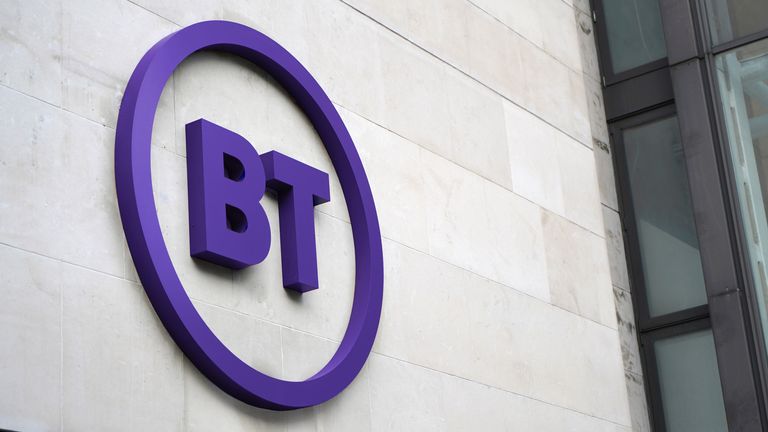More than 40,000 BT workers to begin strike action at the end of July, union says
The industrial action may cause "significant issues" for those working from home and is likely to have a "serious effect" on the rollout of ultra-fast broadband, the Communication Workers Union said.
Monday 18 July 2022 15:19, UK
More than 40,000 BT workers will go on strike on 29 July and 1 August, the Communication Workers Union (CWU) has said.
The union said the industrial action may cause "significant issues" for those working from home and is likely to have a "serious effect" on the rollout of ultra-fast broadband.
BT staff voted last month to go on strike for the first time in 35 years, with union bosses arguing that a £1,500 pay rise proposed by the company was inadequate to help staff deal with the cost of living crisis.
The former state-owned monopoly is responsible for answering all 999 calls and has been drawing up contingency plans to manage any disruption, Sky News understands.
CWU general secretary Dave Ward said: "For the first time since 1987, strike action will now commence at BT Group.
"This is not a case of an employer refusing to meet a union's demands - this is about an employer refusing to meet us whatsoever.
"The serious disruption this strike may cause is entirely down to [chief executive] Philip Jansen and his friends, who have chosen to stick two fingers up to their own workforce."
Read more: BT shows it is not as stretched financially as it was a few years ago
He said BT staff had received a real-terms pay cut as a reward for working "under great difficulty" during the pandemic.
"These are the same workers who kept the country connected during the pandemic," he said.
"Without CWU members in BT Group, there would have been no home-working revolution, and vital technical infrastructure may have malfunctioned or been broken when our country most needed it."
He said Mr Jansen had "gifted himself" a £3.5m pay package amounting to a 32% pay increase, while BT's chief financial officer received £2.2m - a 25% increase.
He said £700m has also been paid out to shareholders.
Listen and subscribe to The Ian King Business Podcast here.
"The reason for the strike is simple: workers will not accept a massive deterioration in their living standards," Mr Ward said.
"We won't have bosses using Swiss banks while workers are using food banks.
"BT Group workers are saying: enough is enough. We are not going to stop until we win."
Deputy general secretary Andy Kerr said management had refused to meet the union to negotiate a pay deal.
BT says its pay award was the highest in 20 years
BT Group said it will work to minimise any disruption and "keep our customers and country connected" using "tried and tested processes" for large-scale absences which were proven to work during the pandemic.
The company said it spent two months negotiating with the CWU at the start of this year.
"When it became clear that we were not going to reach an accord, we took the decision to go ahead with awarding our team member and frontline colleagues the highest pay award in more than 20 years, effective 1st April," a spokesperson said.
"We have confirmed to the CWU that we won't be reopening the 2022 pay review, having already made the best award we could.
"We're balancing the complex and competing demands of our stakeholders and that includes making once-in-a-generation investments to upgrade the country's broadband and mobile networks, vital for the UK economy and for BT Group's future - including our people."
BT is among a string of companies, including British Airways and Royal Mail, that are facing the most significant industrial unrest for years as millions of Britons struggle to cope with soaring inflation.



